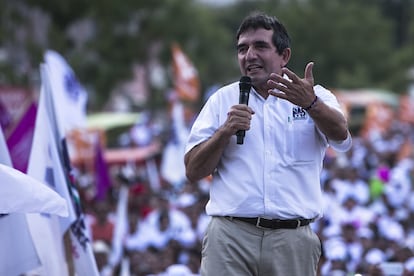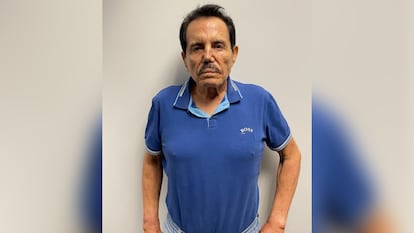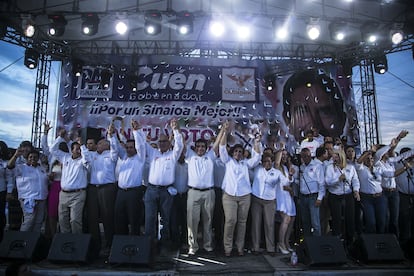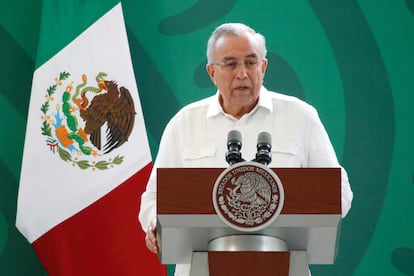Scandals, the shadow of El Mayo and the war against Governor Rocha: The tangled life and death of Héctor Cuén
The biography of the former rector of the biggest university in Sinaloa was marked by tragedy, intrigues, and power struggles. The controversy has extended to his murder, with no answers as to who killed him and why

One crime, at least two versions of what happened, and three weeks of unanswered questions. The mystery surrounding the murder of Héctor Melesio Cuén has grown in the shadow of another scandal: the arrest in the United States of Ismael “El Mayo” Zambada and Joaquín Guzmán López, one of “El Chapo” Guzmán’s sons. Both were announced on July 25 within hours of each other, as unrelated events. Cuén, as everyone referred to him, was the rector of the most important public university in Sinaloa, where he built an empire that lasted almost 20 years; municipal president of Culiacán, the state capital; legislator of the local Congress, and founder and undisputed leader of his own political force, the Sinaloa Party (PAS). He boasted of being a successful businessman and of having been key to Governor Rubén Rocha Moya’s triumph in the 2021 state elections. He was weeks away from becoming a federal deputy, until he was shot four times and died after being taken to hospital, according to the main witness in the case.
Despite being virtually unknown in the rest of the country, Cuén’s influence in Sinaloa went beyond his resume. He had been at open war with Governor Rocha, his former ally and main political adversary, for more than a year and a half. He was implacable with the press, crushed critics and rivals, had been linked to drug trafficking on several occasions and his family was at the center of a judicial battle for corruption. His death also sparked controversy and has placed the local Attorney General’s Office on the ropes after it failed to come up with a convincing explanation of who killed him and why. And then, just when it seemed that the scandal had died down, El Mayo broke his silence.
The Sinaloa Cartel leader placed the authorities’ version of his arrest under scrutiny and dropped the bombshell that he had been betrayed after being summoned to a meeting with Governor Rocha and Cuén, two of Sinaloa’s most powerful politicians. Describing Cuén as “a longtime friend of mine,” Zambada said a week ago through a letter released by his lawyer: “I know that the official version given by the Sinaloa state authorities is that Héctor Cuén was shot the night of July 25 at a gas station by two men who wanted to steal his pick-up truck. That’s not what happened. They killed him at the same time and in the same place where they kidnapped me.”
The Attorney General’s Office maintains that the victim died at a gas station in La Presita; El Mayo says he was killed at the Huertos del Pedregal ranch, 12 kilometers away. Authorities say the time of death was after 11:00 p.m.; Zambada says it took place around 11:00 a.m. The investigation indicates that attempted robbery was the motive for the murder; the capo attributes what happened to a meeting that went wrong. Rocha insists that he did not participate in the private meeting and that he was in Los Angeles, California, 1,500 kilometers from Culiacán. “If they said I was going to be there, they lied, and if he believed them, he fell into the trap,” said the governor at an event with President Andrés Manuel López Obrador and the president-elect, Claudia Sheinbaum. The reason for the meeting, according to El Mayo’s letter, was to resolve the conflict between the politicians over control of the Autonomous University of Sinaloa (UAS).

The professor
Cuén was born in 1955 in Badiraguato, a town that has gained notoriety for also being the birthplace of El Chapo and another Sinaloa Cartel kingpin, Rafael Caro Quintero. His father, Melesio Cuén Cazares, was municipal president on five occasions, the last being three years before Héctor was born. The link between Cuén Cazares and the incipient opium trade in the region is documented. “Melesio was one of those in charge of supervising the harvesting and trafficking of the drug, having knowledge of the operations carried out by the anti-drug authorities in Badiraguato,” wrote Sinaloa-based researcher Juan Antonio Fernández.
The family moved to Culiacán when Héctor Cuén was just a child. “He was a very healthy young man, a marathon runner, a good family man, not very friendly with his neighbors,” says Ana Luz Ruelas, professor emeritus at the UAS and a neighbor of Cuén’s when he was studying to be a pharmaceutical chemist-biologist at the university.
Cuén began his career as a professor at UAS and rose through the ranks to become director of his faculty. His trajectory changed when he held the position of head of assets and inventories at the university from 1997 to 2005, and took the reins of the institution’s financial mechanism, despite not having related studies. Before the end of his tenure, he considered the possibility of seeking the rectorship, and in mid-2005 he obtained the position. “Nothing would ever be the same again,” wrote his wife, Angélica Díaz, in a book of memoirs.
With over 170,000 students, UAS is the most important educational institution in the state and one of the largest in the country. “To speak of the UAS is to speak of a bastion of Sinaloa,” explains Carlos Ayala, a researcher at the faculty of philosophy and letters. The institution has an allocated budget of more than 8.7 billion pesos ($0.46 billion) for this year.
In fact, everything changed after Cuén, the last rector elected by the direct vote of university students. In 2006, a new selection method was implemented and it was determined that all top positions would be elected by the University Council, headed and dominated by the rector. All candidates for executive positions went through a commission, also controlled by the rector, which “approved” the candidates and submitted them to a vote by the Council.
“They told us who we had to vote for; everything was arranged so that profiles close to Cuén would get in,” says analyst Alfredo Brambila, who was a student councilor. That is how Cuén gained absolute control of the university. Ruelas, with four decades in the institution, agrees: “There were some of us who dared to apply, but those selected were professors with little presence, in great need of job stability, close to their political group.”
The circle closes with alliances between the former rector and the governors in office. “Almost all of them submitted or were complicit,” says Ruelas, who describes the Cuén’s legacy as “ominous and nefarious.” Cuén closed his cycle in the rectorship in 2009 but continued to appear at all relevant events while placing family and friends in academic and administrative positions. “He was a great corruptor and it will take years to reverse the damage,” Brambila notes.
“He was a tiger; he exercised very solid leadership and is a figure that will be difficult to surpass, that is why many people think that it could have been a crime with other characteristics,” says Ayala. Cuén always denied being the power behind the scenes: “I am a worker, plain and simple,” he said. The UAS spokesman did not respond to an interview request.

The politician
Boosted by the prestige of the rector’s office, Cuén sought the National Action Party (PAN) candidacy for governor, but then stepped aside. In the 2010 election, the professor found a place on the other side of the aisle: he was a mayoral candidate in Culiacán for the coalition of the Institutional Revolutionary Party (PRI) and Nueva Alianza, and won with 55% of the vote.
He took office in January 2011 but only stayed for a year and asked for a leave of absence to run for a senatorial seat. The PRI closed the door on him and he ended up running for Nueva Alianza, coming third in the July elections. Eleven days after his defeat, his brother and former director of sports at UAS, Jesús Alfredo Cuén, was murdered outside a restaurant in Culiacán. Two hired assassins on a motorcycle riddled him with bullets, a version of events similar to that of the murder of Héctor Cuén 12 years later. In the midst of the scandal, Yesenia Armenta, the victim’s wife, was accused of being the mastermind and of paying 85,000 pesos to two members of the Sinaloa Cartel to kill her husband.
Exasperated by the disdain of the PRI and PAN, Cuén founded his own party, PAS, in August 2012. A year later he obtained a plurinominal seat. He entered the local Congress together with Robespierre Lizárraga, his personal secretary in the mayor’s office of Culiacán and current head of the UAS rector’s office, and Rosario Sánchez, former university counselor.
PAS’ power has always been shored up in the UAS. “It is Cuén’s political arm,” summarizes Brambila. The analyst affirms that it has been instrumental in the aspirations of its founder: it used the university structure for the party and used the party to guarantee the flow of resources to the university. The symbiosis between both institutions and Cuén’s inner circle is more evident in the party: Cuén was the leader of PAS for almost all of its existence; his wife has been a deputy on two occasions; the current leader, Víctor Antonio Corrales, succeeded him as rector of the UAS, and the vast majority of its elected representatives have been teachers, directors or graduates of the university. The party did not respond to an interview request from this newspaper.
It has also been a vehicle for negotiating with all political forces in Sinaloa. In 2016, after a pact with the PAN fell through, Cuén ended up running for governor in coalition with Movimiento Ciudadano (MC). He came in second place with more than 250,000 votes, 26%, against PRI candidate Quirino Ordaz. MC repaid the favor and lent him its acronym to run for the Senate in 2018, but he fell far short. “He was capable of allying himself with anyone who would guarantee him and his people positions,” says Ruelas.
Ordaz and Cuén, old rivals, explored the possibility of PAS and PRI joining forces in 2021, but the professor found a better option. “He saw the rise of the López Obrador phenomenon and rode the wave,” Ruelas recalls. In February of that year, Mario Delgado, the leader of Morena, López Obrador’s party, sealed the pact, despite criticism over his pragmatism. “We are going to put the interest of change in Sinaloa first,” he said.
The agreement was that Rocha would be the candidate. Cuén had recently recovered from pancreatic cancer, detected two years earlier, although he told the weekly RíoDoce that this was not a factor. However, he remained a notorious protagonist in the campaign: he was the candidate’s shadow and thought that fair payment for his support was to “co-govern” with Rocha. Cuén was convinced that PAS was going to give the coalition 250,000 votes, but he only contributed 90,000. Morena could have easily won on its own, obtaining 530,000 votes, twice as many as the PRI. “They are like water and oil and run the risk of ending badly,” predicted former presidential candidate Francisco Labastida.
Thanks to the alliance, PAS secured the best election result in its history: it became the second force in the local Congress and won six of the 18 city councils up for grabs. The elections were shrouded in controversy: dozens of PRI operators were removed on the eve of the election and the opposition claimed that the Sinaloa Cartel was decisive in the results. “[Rocha] became governor with the support of the narcos, that is widely known,” Labastida told journalist Carmen Aristegui last week. The governor has denied any links to organized crime.
The influence of the cartels in Sinaloa politics is a thorny issue. Ayala posits that “there are myths and realities.” “I don’t think that there is a decision of that nature at the level of state governments, but there is an intervention in municipal governments,” says the academic. Brambila, a former state security official, is blunter. “Nobody governs in Sinaloa if they don’t make a pact,” he states, adding that organized crime is essential for moving resources and people, and discouraging voting. “Everything is smeared by drug trafficking in Sinaloa,” laments Ruelas. “An open secret,” is how Brambila and Ruelas refer to the links between Cuén and the cartels. Although he was never prosecuted, it was El Mayo who claimed they were “friends.”
Even so, Rocha named Cuén secretary of health. Like him, the governor was born in Badiraguato and had been rector of the UAS (1993-1997), but the differences between the two were not long in emerging. The governor demanded his ally withdraw a series of lawsuits against journalists, among them against the newly appointed state secretary for women, but he refused. There was a very public rift. Cuén, who never conceived of being second in command, was dismissed six months after taking office.
“Politics is for making friends and the work is done first,” Cuén repeated like a mantra. In his brief idyll with Morena he published photos with figures such as Mario Delgado, Ricardo Monreal, or Manuel Bartlett, but among the few he openly called “friends” was Adán Augusto López, for whom he campaigned for Morena’s presidential candidacy. Paradoxically, López Obrador always kept his distance from Cuén and referred to him on several occasions as a “chieftain.”
Even until the middle of last year Cuén said that his alliance with Morena was firm, but in a matter of months his photo album took a radical turn. In November he appeared among Jesús Zambrano, Marko Cortés and Alejandro “Alito” Moreno to make official his support for Xóchitl Gálvez as presidential candidate. In exchange, the PRI assured him a plurinominal federal seat in 2024. Despite being the party with the most activists in Sinaloa and having more than 160,000 affiliates, it has not surpassed 100,000 votes for eight years.

The businessman
The lawsuit between Rocha and Cuén moved to a conflict for the control of the UAS. At the beginning of 2023, a package of reforms to the university’s statute was presented. Morena argues that Cuén’s dominance must be ended, direct voting must be returned to elect the rector, and the institution’s oversight must be strengthened. The current administration, linked to Cuén, considers this a flagrant violation of university autonomy and has filed injunctions to stop the legislative process. The dispute remains heated.
The war has also been waged on other fronts. The Sinaloa Prosecutor’s Office, subordinated to Rocha according to PAS, has accused Cuén’s circle of corruption in the management of UAS resources. The rector-elect, Jesús Madueña, was removed from his post last October and faces nine accusations of irregular management. Cuén’s son, Héctor Cuén Díaz, was indicted last week for “illicit negotiations.”
The family owns an empire that includes restaurants, laboratories, and commercial premises. Some of the fraud accusations against them are unusual and involve spending millions on tortillas and totopos using university money. The Cuén family and the UAS claim that they are victims of political persecution. Cuén was accused of illicit enrichment in 2011, but the Attorney General’s Office dismissed the case.
Cuén’s political group hit back by denouncing irregularities in Rocha’s government amounting to 2.9 billion pesos. “We caught them red-handed,” he said on July 18. It was leaked to the press that two of the governor’s sons were “freeloaders” and were paid without working at the UAS.
Along the way, there have been other scandals. The PAS accused Rocha of kidnapping one of its candidates last April and Cuén also blamed him for the National Guard withdrawing his escort. “We hold the Government of Sinaloa responsible for whatever may happen,” he said three weeks before his murder. The UAS spokesman was the victim of an attack in early July. In his last week alive, the former mayor accused the governor on social media of “messing with his family,” “destroying the UAS,” and “espionage.”
The open war between the former allies ended abruptly with Cuén’s murder. Almost no one dares to predict what will become of the PAS or the UAS and the only certainty is that the scandal is still alive in Sinaloa. In the latest twist in the case, the Attorney General’s Office (FGR) dealt another blow to the credibility of the Sinaloa Prosecutor’s Office, stating that the investigation into Cuén’s death is full of irregularities. Rocha subsequently announced that the state prosecutor had submitted her “voluntary resignation,” while López Obrador demanded a “thorough investigation.”
Federal authorities say the autopsy was not carried out properly. The crime scene and the vehicle in which the victim was supposedly traveling were not secured. A step-by-step report on how the homicide occurred was not prepared. There is no consistency between the testimonies of the gas station employees and the main witness in the case, Fausto Corrales, who was driving the truck and is the son of the current president of the PAS. The protocols were not followed and the body was allowed to be incinerated before the investigations were concluded. Everything was exposed in a statement from the FGR, which has already taken over the case. There are only unknowns and intrigues in Sinaloa after the murder of the professor and the letter published by El Mayo.

Sign up for our weekly newsletter to get more English-language news coverage from EL PAÍS USA Edition
Tu suscripción se está usando en otro dispositivo
¿Quieres añadir otro usuario a tu suscripción?
Si continúas leyendo en este dispositivo, no se podrá leer en el otro.
FlechaTu suscripción se está usando en otro dispositivo y solo puedes acceder a EL PAÍS desde un dispositivo a la vez.
Si quieres compartir tu cuenta, cambia tu suscripción a la modalidad Premium, así podrás añadir otro usuario. Cada uno accederá con su propia cuenta de email, lo que os permitirá personalizar vuestra experiencia en EL PAÍS.
¿Tienes una suscripción de empresa? Accede aquí para contratar más cuentas.
En el caso de no saber quién está usando tu cuenta, te recomendamos cambiar tu contraseña aquí.
Si decides continuar compartiendo tu cuenta, este mensaje se mostrará en tu dispositivo y en el de la otra persona que está usando tu cuenta de forma indefinida, afectando a tu experiencia de lectura. Puedes consultar aquí los términos y condiciones de la suscripción digital.









































